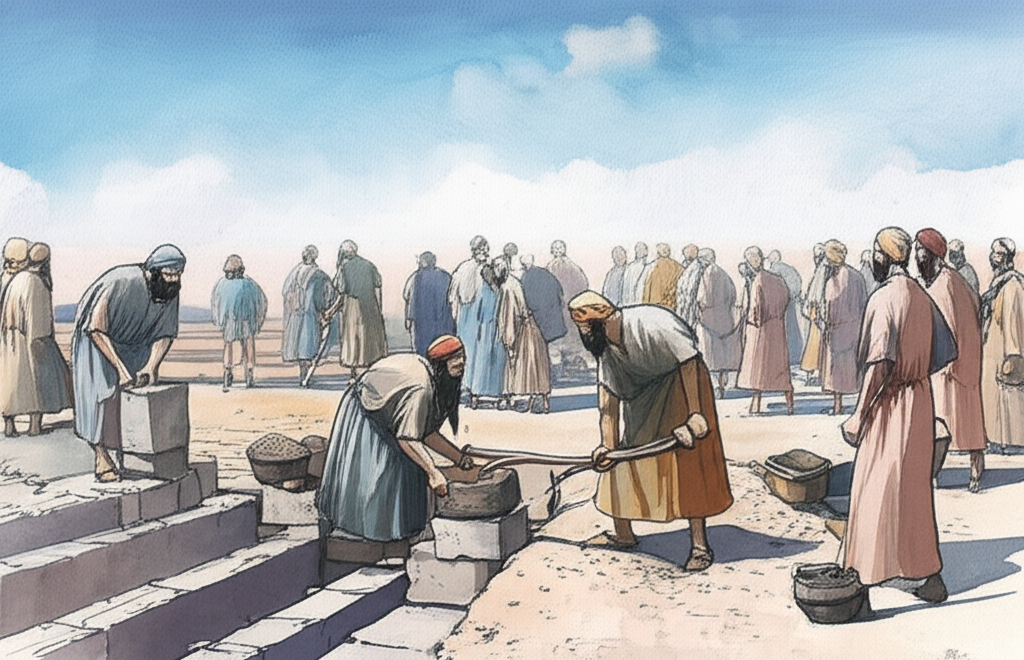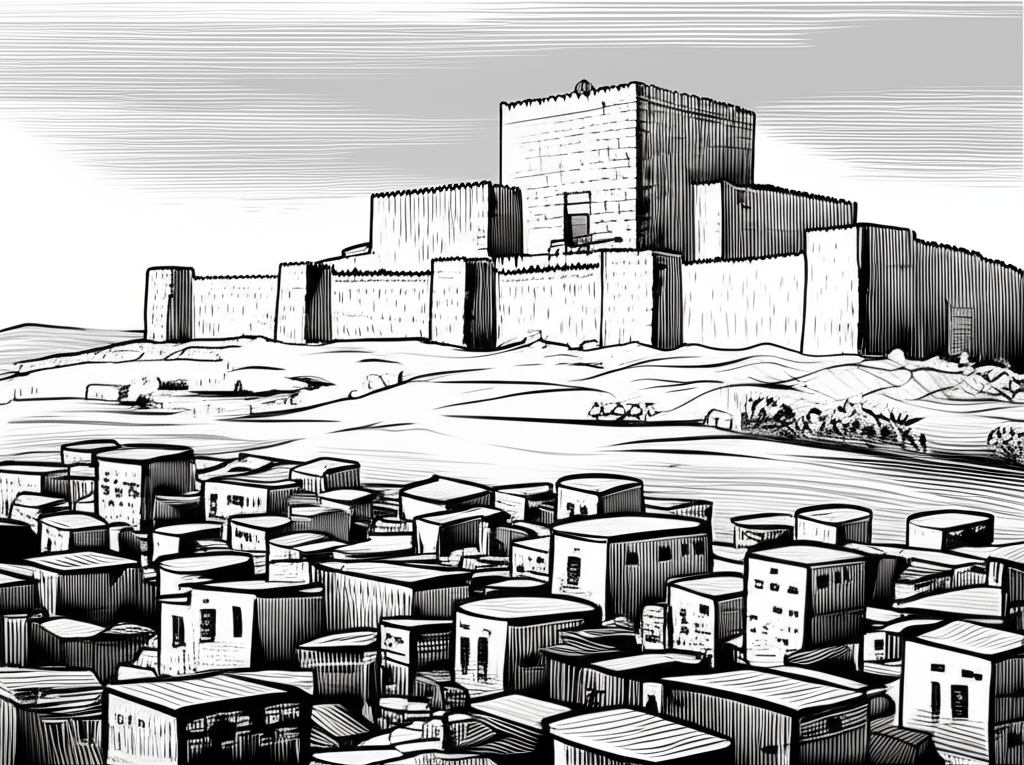Ezra 4 meaning explained in AI Summary
Ezra chapter 4 describes the opposition faced by the Jews as they rebuilt the temple in Jerusalem.
1. Initial Offer of Help (verses 1-3):
- The descendants of the people who had been relocated by the Assyrians (Samaritans) approach the Jews and offer to help rebuild the temple.
- They claim to worship the same God and have been offering sacrifices since the time of Esarhaddon, the Assyrian king who brought them there.
2. Refusal and Growing Hostility (verses 4-5):
- Zerubbabel, Jeshua, and the heads of the families of Israel refuse the offer.
- They insist that only descendants of Judah and Benjamin, who had been taken captive to Babylon, should rebuild the temple.
- This refusal angers the Samaritans, who then actively work to discourage and frustrate the Jews' efforts.
3. Sabotage and Delays (verses 6-24):
- The Samaritans use various tactics to hinder the temple reconstruction:
- Slander and Accusations: They send letters to the Persian kings, accusing the Jews of rebellion and sedition.
- Bribery and Intimidation: They bribe officials and use threats to halt the work.
- This opposition continues throughout the reigns of several Persian kings: Cyrus, Xerxes (Ahasuerus), Artaxerxes, and Darius.
- The temple construction is eventually halted until the second year of Darius' reign.
Key Themes:
- Religious Purity: The Jews' refusal to allow the Samaritans to participate highlights their concern for maintaining the purity of their faith and worship.
- Spiritual Opposition: The chapter demonstrates how spiritual endeavors often face opposition and obstacles, even when seemingly well-intentioned.
- Perseverance and Hope: Despite the setbacks and delays, the story foreshadows the eventual completion of the temple, emphasizing the importance of perseverance and faith.
Ezra chapter 4 sets the stage for the ongoing conflict between the Jews and the Samaritans, a conflict that would continue for centuries. It also highlights the challenges faced by the returning exiles as they sought to rebuild their lives and their faith in Jerusalem.
Ezra 4 bible study ai commentary
Ezra 4 recounts the persistent and multifaceted opposition faced by the returned Jewish exiles. The adversaries first attempt to corrupt the rebuilding of the temple by deceptively offering to join the project. When their offer is righteously rejected, they pivot to a campaign of discouragement, political slander, and legal maneuvering that successfully halts the work on God's house for over fifteen years. The chapter strategically presents a long-term pattern of hostility, demonstrating that the work of God will always attract spiritual and political resistance.
Ezra 4 context
The events follow the edict of Cyrus the Great (c. 538 BC), which permitted the Jews to return to Judah and rebuild the temple in Jerusalem. The "adversaries" are primarily the mixed population residing in the region of Samaria, who were resettled there by the Assyrian empire after the fall of the northern kingdom of Israel in 722 BC (2 Kings 17). Their worship was syncretistic, blending rituals of YHWH with pagan practices. The narrative jumps forward in time (v. 6-23) to detail later opposition during the reigns of Xerxes and Artaxerxes concerning the city walls, before returning to the initial period of temple building. This non-chronological or thematic structure emphasizes the relentless, generational nature of the opposition to God's restorative work in Jerusalem.
Ezra 4:1-2
Now when the adversaries of Judah and Benjamin heard that the returned exiles were building a temple to the LORD, the God of Israel, they approached Zerubbabel and the heads of fathers' houses and said to them, “Let us build with you, for we worship your God as you do, and we have been sacrificing to him ever since the days of Esarhaddon king of Assyria, who brought us here.”
In-depth-analysis
- Adversaries: The term (tsār) implies active hostility and distress. These are the Samaritans, a people of mixed ethnicity and syncretistic faith (2 Kin 17:24-34), who saw the returned exiles and their exclusive worship of Yahweh as a threat.
- "Let us build with you": A deceptive offer of syncretism. It appears helpful but is designed to infiltrate, corrupt, and control the project. The motive is not pure worship but likely a desire for political influence and to dilute the unique covenant identity of Judah.
- "We worship your God as you do": This is a dangerous half-truth. While they may have incorporated YHWH into their pantheon, their worship was not according to God's specific commands given to Israel and was polluted with idolatry (2 Kin 17:41).
- Esarhaddon: King of Assyria (681–669 BC). This reference authenticates their historical claim of being resettled in the land but also confirms their non-Israelite origins and the flawed foundation of their worship.
Bible references
- 2 Kings 17:33: "...They feared the LORD but also served their own gods, after the manner of the nations from among whom they had been carried away." (Defines their syncretistic worship).
- 2 Corinthians 6:14-15: "Do not be unequally yoked with unbelievers. For what partnership has righteousness with lawlessness? Or what fellowship has light with darkness?" (Articulates the principle of separation behind Zerubbabel's later refusal).
- Matthew 7:15: "Beware of false prophets, who come to you in sheep's clothing but inwardly are ravenous wolves." (Warns against deceptive appearances).
Cross references
Neh 4:1-2 (active opposition), Neh 6:1-9 (deceptive plots), Joh 4:20-22 (Jesus clarifies true worship to a Samaritan woman), Act 20:29-30 (wolves from within the flock), Gal 1:7-8 (danger of a distorted gospel).
Ezra 4:3
But Zerubbabel and Jeshua and the rest of the heads of fathers' houses in Israel said to them, “You have nothing to do with us in building a house to our God; but we alone will build to the LORD, the God of Israel, as King Cyrus the king of Persia has commanded us.”
In-depth-analysis
- "You have nothing to do with us": A firm and necessary rejection. The Hebrew (lō’-lāḵem wālānû) is emphatic, creating a sharp boundary. This is not about ethnic bigotry but theological purity.
- A house to our God: The possessive "our" emphasizes Israel's unique covenant relationship with Yahweh, which the Samaritans do not share. The project was sacred, not merely civic.
- We alone will build: A declaration of commitment to God's specific commission. The purity of the builders was as important as the purity of the building.
- As King Cyrus... has commanded us: The leaders ground their refusal in their legal, royal mandate from Cyrus. They were authorized as a specific people ("us") to do this work, giving them a political and spiritual basis for excluding others.
Bible references
- Deuteronomy 12:30-31: "...Be careful not to be ensnared... and that you do not inquire about their gods, saying, ‘How did these nations serve their gods?—that I also may do the same.’" (Forbids the mixing of worship practices).
- Nehemiah 2:20: "The God of heaven will make us prosper, and we his servants will arise and build, but you have no portion or right or claim in Jerusalem." (Nehemiah’s parallel rejection of Sanballat).
- 1 Corinthians 3:10-11: "I laid a foundation, and another is building on it. But let each one take care how he builds upon it. For no one can lay a foundation other than that which is laid, which is Jesus Christ." (Highlights the importance of a true foundation).
Cross references
Exd 34:12-16 (warnings against covenants with inhabitants), Deu 7:2-4 (no intermingling with pagan nations), 1 Cor 5:11 (separation from professed believers living in sin).
Ezra 4:4-5
Then the people of the land discouraged the people of Judah and made them afraid to build and hired counselors against them to frustrate their purpose, all the days of Cyrus king of Persia, even until the reign of Darius king of Persia.
In-depth-analysis
- Discouraged... made them afraid: When infiltration fails, the enemy's next tactic is intimidation and psychological warfare. The Hebrew for "discouraged" is literally "weakened their hands."
- Hired counselors: This refers to professional lobbyists or agents hired to work against the Jews' interests in the Persian court. They used bribery and political maneuvering to undermine the project legally.
- Frustrate their purpose: The opposition's goal was not just to delay but to completely thwart God's commanded plan.
- All the days of Cyrus... until Darius: This phrase brackets the entire period of inaction, which lasted about 16 years (c. 536-520 BC). This prolonged opposition successfully wore down the builders' will.
Bible references
- Nehemiah 6:9: "For they all wanted to frighten us, thinking, ‘Their hands will drop from the work, and it will not be done.’ But now, O God, strengthen my hands." (Identical tactic and the correct prayerful response).
- Zechariah 3:1: "Then he showed me Joshua the high priest standing before the angel of the LORD, and Satan standing at his right hand to accuse him." (A spiritual picture of the "counselors" hired to accuse God's people).
- Acts 4:18: "So they called them and charged them not to speak or teach at all in the name of Jesus." (Opposition moving from debate to threats and official prohibition).
Cross references
Neh 4:11 (threats of violence), Est 3:8-9 (Haman's slanderous counsel), Dan 6:4-9 (conspiracy using legal means), Isa 35:3-4 (prophetic command to strengthen weak hands).
Ezra 4:6-23: The Great Parenthesis - Opposition to the City Walls
This section leaps forward in time to demonstrate the consistent pattern of opposition. The author groups these events thematically to show that the hostility in his own day (time of Ezra/Nehemiah) had deep roots. From verse 8 onwards, the text switches from Hebrew to Aramaic, the official administrative language of the Persian empire, indicating a section dealing with official correspondence.
Ezra 4:6 - Accusation under Ahasuerus (Xerxes I)
In the reign of Ahasuerus, in the beginning of his reign, they wrote an accusation against the inhabitants of Judah and Jerusalem.
- Ahasuerus: This is Xerxes I (486-465 BC), the king from the book of Esther. This takes place decades after the temple was completed (516 BC), showing that opposition was a generational problem. This accusation concerned the city, not the temple.
Ezra 4:7-16 - Accusation under Artaxerxes I
...they wrote a letter against Jerusalem to Artaxerxes the king... “Be it known to the king that the Jews who came up from you to us have gone to Jerusalem. They are rebuilding that rebellious and wicked city... Be it known now to the king that if this city is rebuilt and the walls finished, they will not pay tribute, custom, or toll, and the royal revenue will be impaired...”
- Rebellious and wicked city: The opponents slander Jerusalem by citing its pre-exilic history of rebellion against Mesopotamian empires. This is a clever political argument, framing a religious/civic project as a national security threat.
- They will not pay tribute: The ultimate argument to a king is economic. The accusation that the royal revenue will suffer is a powerful and effective motivator for the monarch to intervene. This argument is pragmatic and entirely secular.
Ezra 4:17-23 - The King's Decree
The king sent an answer... “make a search... this city from of old has risen against kings... make a decree that these men be made to cease, and that this city be not rebuilt... And they went in haste to Jerusalem... and made them cease by force and power.”
- Search was made: The Persian bureaucracy was efficient. They searched the imperial archives and found evidence of Jerusalem's past rebellions, seemingly validating the accusers' claims.
- Force and power: The local authorities use the king's decree to stop the work on the city walls violently and immediately. This demonstrates the real-world power of slander and political maneuvering.
Bible references
- Esther 3:8: "Then Haman said to King Ahasuerus, ‘There is a certain people... whose laws are different from those of every other people, and they do not keep the king's laws, so that it is not to the king's profit to tolerate them.’" (Shows the same slanderous tactic used against the Jews under the same king, Xerxes).
- John 19:12: "...the Jews cried out, ‘If you release this man, you are not Caesar's friend. Everyone who makes himself a king opposes Caesar.’" (The accusation against Jesus is shifted to a political one to force Pilate's hand).
Cross references
Amos 7:10-13 (Amaziah's false report about Amos), Luk 23:2 (accusations against Jesus mixing religious and political rebellion).
Polemics: This section challenges a simplistic view that God's will is always accomplished without struggle. It shows that political realities, lies, and hostile human powers can and do cause significant, real-world setbacks to God's people and their work. However, the wider context of Ezra-Nehemiah shows that these setbacks are temporary and ultimately overcome by God's sovereign hand, often through the exhortation of prophets and the courage of leaders.
Ezra 4:24
Then the work on the house of God that is in Jerusalem stopped, and it ceased until the second year of the reign of Darius king of Persia.
In-depth-analysis
- Then... stopped: The author now skillfully connects the end of his "parenthesis" (v. 23) back to the main narrative of the temple. The word "then" (ʾěḏayin, Aramaic) links the spirit of the successful opposition against the walls with the cause of the temple work ceasing years earlier.
- Work on the house of God... stopped: The long-term discouragement and political frustration detailed in verses 4-5 finally took their toll. The successful opposition documented in vv. 6-23 serves as a powerful illustration of why the earlier generation gave up.
- Until the second year of... Darius: This verse concludes the chapter by setting the stage for Ezra 5. It creates narrative tension and points to the moment God will intervene to restart the work through the prophets Haggai and Zechariah. Darius I reigned from 522-486 BC, so the "second year" is 520 BC.
Bible references
- Haggai 1:2-4: "Thus says the LORD of hosts: These people say the time has not yet come to rebuild the house of the LORD... Is it a time for you yourselves to dwell in your paneled houses, while this house lies in ruins?" (The prophetic word that directly addresses and rebukes this stoppage).
- Zechariah 1:16: "Therefore, thus says the LORD, I have returned to Jerusalem with mercy; my house shall be built in it, declares the LORD of hosts..." (God's definitive promise that reverses the situation described in Ezra 4:24).
- Ezra 5:1-2: "Now the prophets, Haggai and Zechariah... prophesied to the Jews who were in Judah and Jerusalem... Then Zerubbabel... and Jeshua... arose and began to rebuild the house of God that is in Jerusalem..." (The direct continuation and divine solution to the problem of Ezra 4).
Cross references
Hag 1:9 (consequences of neglecting God's house), Hag 2:4-5 (God's promise of his presence to overcome fear), 1 Pet 4:12 (don't be surprised by fiery trials).
Ezra chapter 4 analysis
- Thematic over Chronological Structure: Ezra 4 is not a strict chronological account. The author intentionally inserts the later story of opposition to the city walls (vv. 6-23, which occurred c. 486-445 BC) into the middle of the narrative about opposition to the temple (c. 536-520 BC). This literary technique, sometimes called a thematic montage, powerfully demonstrates that opposition to God's work is a persistent, generational reality. It paints a comprehensive picture of the enemy's playbook.
- The Playbook of Opposition: The chapter outlines a clear progression of adversarial tactics still used against God's people today:
- Infiltration & Corruption: "Let us build with you" (v. 2). A deceptive offer to join and dilute the work from within.
- Intimidation & Discouragement: "Weakening their hands" (v. 4). Psychological warfare to create fear and apathy.
- Political Slander & Legal Maneuvering: "Hired counselors" (v. 5) and letters of accusation (vv. 8-16). Using the systems of the world to attack God's people.
- Physical Force: "Made them cease by force and power" (v. 23). The final resort when other methods succeed.
- Spiritual Warfare in Plain Sight: While the text describes political and social opposition, it's underpinned by a spiritual battle. The rejection of the Samaritan offer (v. 3) is a defense of theological purity. Satan's role as "the accuser" (Rev 12:10) is played out by Rehum and Shimshai. The "weakened hands" (v. 4) that Nehemiah later prays to strengthen (Neh 6:9) reveals that the battle is won or lost in the resolve and faith of God's people.
Ezra 4 summary
Adversaries of the returned exiles, the Samaritans, first attempt to corrupt the temple rebuilding project with a deceptive offer of help. When rejected for their syncretistic worship, they launch a long-term campaign of intimidation, slander, and political maneuvering. Ezra highlights this persistent hostility by including a later account of successful opposition to the rebuilding of Jerusalem's walls. This prolonged opposition ultimately discourages the people, and the work on God's temple ceases for approximately 16 years until God sends the prophets Haggai and Zechariah to reignite the work.
Ezra 4 AI Image Audio and Video









Ezra chapter 4 kjv
- 1 Now when the adversaries of Judah and Benjamin heard that the children of the captivity builded the temple unto the LORD God of Israel;
- 2 Then they came to Zerubbabel, and to the chief of the fathers, and said unto them, Let us build with you: for we seek your God, as ye do; and we do sacrifice unto him since the days of Esarhaddon king of Assur, which brought us up hither.
- 3 But Zerubbabel, and Jeshua, and the rest of the chief of the fathers of Israel, said unto them, Ye have nothing to do with us to build an house unto our God; but we ourselves together will build unto the LORD God of Israel, as king Cyrus the king of Persia hath commanded us.
- 4 Then the people of the land weakened the hands of the people of Judah, and troubled them in building,
- 5 And hired counsellors against them, to frustrate their purpose, all the days of Cyrus king of Persia, even until the reign of Darius king of Persia.
- 6 And in the reign of Ahasuerus, in the beginning of his reign, wrote they unto him an accusation against the inhabitants of Judah and Jerusalem.
- 7 And in the days of Artaxerxes wrote Bishlam, Mithredath, Tabeel, and the rest of their companions, unto Artaxerxes king of Persia; and the writing of the letter was written in the Syrian tongue, and interpreted in the Syrian tongue.
- 8 Rehum the chancellor and Shimshai the scribe wrote a letter against Jerusalem to Artaxerxes the king in this sort:
- 9 Then wrote Rehum the chancellor, and Shimshai the scribe, and the rest of their companions; the Dinaites, the Apharsathchites, the Tarpelites, the Apharsites, the Archevites, the Babylonians, the Susanchites, the Dehavites, and the Elamites,
- 10 And the rest of the nations whom the great and noble Asnapper brought over, and set in the cities of Samaria, and the rest that are on this side the river, and at such a time.
- 11 This is the copy of the letter that they sent unto him, even unto Artaxerxes the king; Thy servants the men on this side the river, and at such a time.
- 12 Be it known unto the king, that the Jews which came up from thee to us are come unto Jerusalem, building the rebellious and the bad city, and have set up the walls thereof, and joined the foundations.
- 13 Be it known now unto the king, that, if this city be builded, and the walls set up again, then will they not pay toll, tribute, and custom, and so thou shalt endamage the revenue of the kings.
- 14 Now because we have maintenance from the king's palace, and it was not meet for us to see the king's dishonour, therefore have we sent and certified the king;
- 15 That search may be made in the book of the records of thy fathers: so shalt thou find in the book of the records, and know that this city is a rebellious city, and hurtful unto kings and provinces, and that they have moved sedition within the same of old time: for which cause was this city destroyed.
- 16 We certify the king that, if this city be builded again, and the walls thereof set up, by this means thou shalt have no portion on this side the river.
- 17 Then sent the king an answer unto Rehum the chancellor, and to Shimshai the scribe, and to the rest of their companions that dwell in Samaria, and unto the rest beyond the river, Peace, and at such a time.
- 18 The letter which ye sent unto us hath been plainly read before me.
- 19 And I commanded, and search hath been made, and it is found that this city of old time hath made insurrection against kings, and that rebellion and sedition have been made therein.
- 20 There have been mighty kings also over Jerusalem, which have ruled over all countries beyond the river; and toll, tribute, and custom, was paid unto them.
- 21 Give ye now commandment to cause these men to cease, and that this city be not builded, until another commandment shall be given from me.
- 22 Take heed now that ye fail not to do this: why should damage grow to the hurt of the kings?
- 23 Now when the copy of king Artaxerxes' letter was read before Rehum, and Shimshai the scribe, and their companions, they went up in haste to Jerusalem unto the Jews, and made them to cease by force and power.
- 24 Then ceased the work of the house of God which is at Jerusalem. So it ceased unto the second year of the reign of Darius king of Persia.
Ezra chapter 4 nkjv
- 1 Now when the adversaries of Judah and Benjamin heard that the descendants of the captivity were building the temple of the LORD God of Israel,
- 2 they came to Zerubbabel and the heads of the fathers' houses, and said to them, "Let us build with you, for we seek your God as you do; and we have sacrificed to Him since the days of Esarhaddon king of Assyria, who brought us here."
- 3 But Zerubbabel and Jeshua and the rest of the heads of the fathers' houses of Israel said to them, "You may do nothing with us to build a house for our God; but we alone will build to the LORD God of Israel, as King Cyrus the king of Persia has commanded us."
- 4 Then the people of the land tried to discourage the people of Judah. They troubled them in building,
- 5 and hired counselors against them to frustrate their purpose all the days of Cyrus king of Persia, even until the reign of Darius king of Persia.
- 6 In the reign of Ahasuerus, in the beginning of his reign, they wrote an accusation against the inhabitants of Judah and Jerusalem.
- 7 In the days of Artaxerxes also, Bishlam, Mithredath, Tabel, and the rest of their companions wrote to Artaxerxes king of Persia; and the letter was written in Aramaic script, and translated into the Aramaic language.
- 8 Rehum the commander and Shimshai the scribe wrote a letter against Jerusalem to King Artaxerxes in this fashion:
- 9 From Rehum the commander, Shimshai the scribe, and the rest of their companions?representatives of the Dinaites, the Apharsathchites, the Tarpelites, the people of Persia and Erech and Babylon and Shushan, the Dehavites, the Elamites,
- 10 and the rest of the nations whom the great and noble Osnapper took captive and settled in the cities of Samaria and the remainder beyond the River ? and so forth.
- 11 (This is a copy of the letter that they sent him) To King Artaxerxes from your servants, the men of the region beyond the River, and so forth:
- 12 Let it be known to the king that the Jews who came up from you have come to us at Jerusalem, and are building the rebellious and evil city, and are finishing its walls and repairing the foundations.
- 13 Let it now be known to the king that, if this city is built and the walls completed, they will not pay tax, tribute, or custom, and the king's treasury will be diminished.
- 14 Now because we receive support from the palace, it was not proper for us to see the king's dishonor; therefore we have sent and informed the king,
- 15 that search may be made in the book of the records of your fathers. And you will find in the book of the records and know that this city is a rebellious city, harmful to kings and provinces, and that they have incited sedition within the city in former times, for which cause this city was destroyed.
- 16 We inform the king that if this city is rebuilt and its walls are completed, the result will be that you will have no dominion beyond the River.
- 17 The king sent an answer: To Rehum the commander, to Shimshai the scribe, to the rest of their companions who dwell in Samaria, and to the remainder beyond the River: Peace, and so forth.
- 18 The letter which you sent to us has been clearly read before me.
- 19 And I gave the command, and a search has been made, and it was found that this city in former times has revolted against kings, and rebellion and sedition have been fostered in it.
- 20 There have also been mighty kings over Jerusalem, who have ruled over all the region beyond the River; and tax, tribute, and custom were paid to them.
- 21 Now give the command to make these men cease, that this city may not be built until the command is given by me.
- 22 Take heed now that you do not fail to do this. Why should damage increase to the hurt of the kings?
- 23 Now when the copy of King Artaxerxes' letter was read before Rehum, Shimshai the scribe, and their companions, they went up in haste to Jerusalem against the Jews, and by force of arms made them cease.
- 24 Thus the work of the house of God which is at Jerusalem ceased, and it was discontinued until the second year of the reign of Darius king of Persia.
Ezra chapter 4 niv
- 1 When the enemies of Judah and Benjamin heard that the exiles were building a temple for the LORD, the God of Israel,
- 2 they came to Zerubbabel and to the heads of the families and said, "Let us help you build because, like you, we seek your God and have been sacrificing to him since the time of Esarhaddon king of Assyria, who brought us here."
- 3 But Zerubbabel, Joshua and the rest of the heads of the families of Israel answered, "You have no part with us in building a temple to our God. We alone will build it for the LORD, the God of Israel, as King Cyrus, the king of Persia, commanded us."
- 4 Then the peoples around them set out to discourage the people of Judah and make them afraid to go on building.
- 5 They bribed officials to work against them and frustrate their plans during the entire reign of Cyrus king of Persia and down to the reign of Darius king of Persia.
- 6 At the beginning of the reign of Xerxes, they lodged an accusation against the people of Judah and Jerusalem.
- 7 And in the days of Artaxerxes king of Persia, Bishlam, Mithredath, Tabeel and the rest of his associates wrote a letter to Artaxerxes. The letter was written in Aramaic script and in the Aramaic language.
- 8 Rehum the commanding officer and Shimshai the secretary wrote a letter against Jerusalem to Artaxerxes the king as follows:
- 9 Rehum the commanding officer and Shimshai the secretary, together with the rest of their associates?the judges, officials and administrators over the people from Persia, Uruk and Babylon, the Elamites of Susa,
- 10 and the other people whom the great and honorable Ashurbanipal deported and settled in the city of Samaria and elsewhere in Trans-Euphrates.
- 11 (This is a copy of the letter they sent him.) To King Artaxerxes, From your servants in Trans-Euphrates:
- 12 The king should know that the people who came up to us from you have gone to Jerusalem and are rebuilding that rebellious and wicked city. They are restoring the walls and repairing the foundations.
- 13 Furthermore, the king should know that if this city is built and its walls are restored, no more taxes, tribute or duty will be paid, and eventually the royal revenues will suffer.
- 14 Now since we are under obligation to the palace and it is not proper for us to see the king dishonored, we are sending this message to inform the king,
- 15 so that a search may be made in the archives of your predecessors. In these records you will find that this city is a rebellious city, troublesome to kings and provinces, a place with a long history of sedition. That is why this city was destroyed.
- 16 We inform the king that if this city is built and its walls are restored, you will be left with nothing in Trans-Euphrates.
- 17 The king sent this reply: To Rehum the commanding officer, Shimshai the secretary and the rest of their associates living in Samaria and elsewhere in Trans-Euphrates: Greetings.
- 18 The letter you sent us has been read and translated in my presence.
- 19 I issued an order and a search was made, and it was found that this city has a long history of revolt against kings and has been a place of rebellion and sedition.
- 20 Jerusalem has had powerful kings ruling over the whole of Trans-Euphrates, and taxes, tribute and duty were paid to them.
- 21 Now issue an order to these men to stop work, so that this city will not be rebuilt until I so order.
- 22 Be careful not to neglect this matter. Why let this threat grow, to the detriment of the royal interests?
- 23 As soon as the copy of the letter of King Artaxerxes was read to Rehum and Shimshai the secretary and their associates, they went immediately to the Jews in Jerusalem and compelled them by force to stop.
- 24 Thus the work on the house of God in Jerusalem came to a standstill until the second year of the reign of Darius king of Persia.
Ezra chapter 4 esv
- 1 Now when the adversaries of Judah and Benjamin heard that the returned exiles were building a temple to the LORD, the God of Israel,
- 2 they approached Zerubbabel and the heads of fathers' houses and said to them, "Let us build with you, for we worship your God as you do, and we have been sacrificing to him ever since the days of Esarhaddon king of Assyria who brought us here."
- 3 But Zerubbabel, Jeshua, and the rest of the heads of fathers' houses in Israel said to them, "You have nothing to do with us in building a house to our God; but we alone will build to the LORD, the God of Israel, as King Cyrus the king of Persia has commanded us."
- 4 Then the people of the land discouraged the people of Judah and made them afraid to build
- 5 and bribed counselors against them to frustrate their purpose, all the days of Cyrus king of Persia, even until the reign of Darius king of Persia.
- 6 And in the reign of Ahasuerus, in the beginning of his reign, they wrote an accusation against the inhabitants of Judah and Jerusalem.
- 7 In the days of Artaxerxes, Bishlam and Mithredath and Tabeel and the rest of their associates wrote to Artaxerxes king of Persia. The letter was written in Aramaic and translated.
- 8 Rehum the commander and Shimshai the scribe wrote a letter against Jerusalem to Artaxerxes the king as follows:
- 9 Rehum the commander, Shimshai the scribe, and the rest of their associates, the judges, the governors, the officials, the Persians, the men of Erech, the Babylonians, the men of Susa, that is, the Elamites,
- 10 and the rest of the nations whom the great and noble Osnappar deported and settled in the cities of Samaria and in the rest of the province Beyond the River.
- 11 (This is a copy of the letter that they sent.) "To Artaxerxes the king: Your servants, the men of the province Beyond the River, send greeting. And now
- 12 be it known to the king that the Jews who came up from you to us have gone to Jerusalem. They are rebuilding that rebellious and wicked city. They are finishing the walls and repairing the foundations.
- 13 Now be it known to the king that if this city is rebuilt and the walls finished, they will not pay tribute, custom, or toll, and the royal revenue will be impaired.
- 14 Now because we eat the salt of the palace and it is not fitting for us to witness the king's dishonor, therefore we send and inform the king,
- 15 in order that search may be made in the book of the records of your fathers. You will find in the book of the records and learn that this city is a rebellious city, hurtful to kings and provinces, and that sedition was stirred up in it from of old. That was why this city was laid waste.
- 16 We make known to the king that if this city is rebuilt and its walls finished, you will then have no possession in the province Beyond the River."
- 17 The king sent an answer: "To Rehum the commander and Shimshai the scribe and the rest of their associates who live in Samaria and in the rest of the province Beyond the River, greeting. And now
- 18 the letter that you sent to us has been plainly read before me.
- 19 And I made a decree, and search has been made, and it has been found that this city from of old has risen against kings, and that rebellion and sedition have been made in it.
- 20 And mighty kings have been over Jerusalem, who ruled over the whole province Beyond the River, to whom tribute, custom, and toll were paid.
- 21 Therefore make a decree that these men be made to cease, and that this city be not rebuilt, until a decree is made by me.
- 22 And take care not to be slack in this matter. Why should damage grow to the hurt of the king?"
- 23 Then, when the copy of King Artaxerxes' letter was read before Rehum and Shimshai the scribe and their associates, they went in haste to the Jews at Jerusalem and by force and power made them cease.
- 24 Then the work on the house of God that is in Jerusalem stopped, and it ceased until the second year of the reign of Darius king of Persia.
Ezra chapter 4 nlt
- 1 The enemies of Judah and Benjamin heard that the exiles were rebuilding a Temple to the LORD, the God of Israel.
- 2 So they approached Zerubbabel and the other leaders and said, "Let us build with you, for we worship your God just as you do. We have sacrificed to him ever since King Esarhaddon of Assyria brought us here."
- 3 But Zerubbabel, Jeshua, and the other leaders of Israel replied, "You may have no part in this work. We alone will build the Temple for the LORD, the God of Israel, just as King Cyrus of Persia commanded us."
- 4 Then the local residents tried to discourage and frighten the people of Judah to keep them from their work.
- 5 They bribed agents to work against them and to frustrate their plans. This went on during the entire reign of King Cyrus of Persia and lasted until King Darius of Persia took the throne.
- 6 Years later when Xerxes began his reign, the enemies of Judah wrote a letter of accusation against the people of Judah and Jerusalem.
- 7 Even later, during the reign of King Artaxerxes of Persia, the enemies of Judah, led by Bishlam, Mithredath, and Tabeel, sent a letter to Artaxerxes in the Aramaic language, and it was translated for the king.
- 8 Rehum the governor and Shimshai the court secretary wrote the letter, telling King Artaxerxes about the situation in Jerusalem.
- 9 They greeted the king for all their colleagues ? the judges and local leaders, the people of Tarpel, the Persians, the Babylonians, and the people of Erech and Susa (that is, Elam).
- 10 They also sent greetings from the rest of the people whom the great and noble Ashurbanipal had deported and relocated in Samaria and throughout the neighboring lands of the province west of the Euphrates River.
- 11 This is a copy of their letter: "To King Artaxerxes, from your loyal subjects in the province west of the Euphrates River.
- 12 "The king should know that the Jews who came here to Jerusalem from Babylon are rebuilding this rebellious and evil city. They have already laid the foundation and will soon finish its walls.
- 13 And the king should know that if this city is rebuilt and its walls are completed, it will be much to your disadvantage, for the Jews will then refuse to pay their tribute, customs, and tolls to you.
- 14 "Since we are your loyal subjects and do not want to see the king dishonored in this way, we have sent the king this information.
- 15 We suggest that a search be made in your ancestors' records, where you will discover what a rebellious city this has been in the past. In fact, it was destroyed because of its long and troublesome history of revolt against the kings and countries who controlled it.
- 16 We declare to the king that if this city is rebuilt and its walls are completed, the province west of the Euphrates River will be lost to you."
- 17 Then King Artaxerxes sent this reply: "To Rehum the governor, Shimshai the court secretary, and their colleagues living in Samaria and throughout the province west of the Euphrates River. Greetings.
- 18 "The letter you sent has been translated and read to me.
- 19 I ordered a search of the records and have found that Jerusalem has indeed been a hotbed of insurrection against many kings. In fact, rebellion and revolt are normal there!
- 20 Powerful kings have ruled over Jerusalem and the entire province west of the Euphrates River, receiving tribute, customs, and tolls.
- 21 Therefore, issue orders to have these men stop their work. That city must not be rebuilt except at my express command.
- 22 Be diligent, and don't neglect this matter, for we must not permit the situation to harm the king's interests."
- 23 When this letter from King Artaxerxes was read to Rehum, Shimshai, and their colleagues, they hurried to Jerusalem. Then, with a show of strength, they forced the Jews to stop building.
- 24 So the work on the Temple of God in Jerusalem had stopped, and it remained at a standstill until the second year of the reign of King Darius of Persia.
- Bible Book of Ezra
- 1 The Proclamation of Cyrus
- 2 The Exiles Return
- 3 Rebuilding the Altar
- 4 Adversaries Oppose the Rebuilding
- 5 Rebuilding Begins Anew
- 6 The Decree of Darius
- 7 Ezra Sent to Teach the People
- 8 Genealogy of Those Who Returned with Ezra
- 9 Ezra Prays About Intermarriage
- 10 The People Confess Their Sin